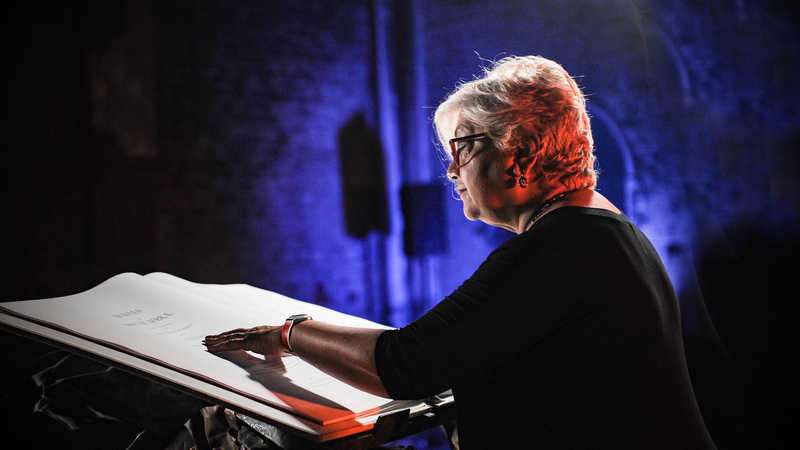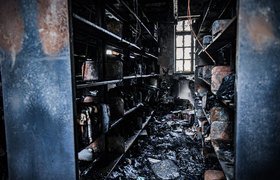Commemorating Jagger Library: UCT, DStv launch ‘Stories from the Ashes’
19 April 2023 | Story Niémah Davids. Videography Ruairi Abrahams, Boikhutso Ntsoko & DIG. Video Edit Boikhutso Ntsoko. Photos Lerato Maduna. Read time 10 min.Who can forget Sunday, 18 April 2021? It was a day of unspeakable tragedy as University of Cape Town (UCT) staff, students and the rest of Cape Town watched helplessly as a runaway wildfire gutted large parts of campus, including the beloved and historic Jagger Library.
There was no stopping those raging flames, as they ripped through a treasured and revered space – a jewel in the crown of the university and home to UCT’s Special Collections, which comprise the African Studies Collection, maps, rare antiquarian books, film and video collections that chronicles events, movements and people from the past; newspapers, journals and magazines, manuscripts and photographs – described as “irreplaceable reminders of where we have come from and who came before us”.
Watching the devastation unfold, it was hard to believe that in time all will be well again. But time heals. And two years after that fateful afternoon, UCT interim vice-chancellor (VC) Emeritus Professor Daya Reddy; the executive director of UCT Libraries, Ujala Satgoor, and other dignitaries gathered adjacent to the Jagger Library site to commemorate the much-loved space and usher in a new beginning. This new beginning takes the shape of a multifaceted project – the Stories from the Ashes – a collaboration between UCT and DStv Africa that aims to resurrect and retell some of the stories lost in the blaze.
A new dawn
The project launch event was held in the Molly Blackburn Hall on upper campus on Tuesday, 18 April. And it includes a special pen and a book, titled Stories from the Ashes – Africa’s Story Through the Last Millennium, made from remnants and ashes from the fire. The book comprises visuals and reprinted extracts that tackle different subjects such as African history, identity, politics, gender and identity, performing arts, language and linguistics, African youth, migration and the African diaspora. It also includes personal reflections by distinguished UCT alumni like Justice Albie Sachs and former VC Dr Mamphela Ramphele. The evening’s programme also included a site tour of the Jagger Library, which, in the aftermath of the blaze, is a mere shell of its former self.
“We are here to celebrate an example of thought leadership that has risen, literally, out of the ashes of the Jagger Library and our Special Collections. In an example of sensitive solidarity with UCT libraries, DStv Africa has partnered with us to help create new literary works for the library. A potent symbol of using devastation to help bring renewal,” Emeritus Professor Reddy said.
A reaffirmed connection
Delivering his welcome address, Reddy said the partnership between UCT and DStv Africa affirms the connection between the university and the broader South Africa.
“UCT doesn’t exist just on campus. We work in partnership with communities that we hope to serve with research and interventions to improve health, governance, technology, infrastructure and other aspects of daily life,” he said.
The partnership with DStv is not just about reconstructing the library and its archives. Instead, it involves restoring treasures that help define our national identity; that represent many branches of our varied cultural heritage, language and stories that make us South Africans. And by making these treasures available to the rest of the world, he said the partnership contributes to the rich tapestry of humanity.
Creating new literary works
But what led to the collaboration between UCT and DStv? Satgoor said in the days after the fire, DStv approached the university with a unique proposal and possible partnership to create new literary work to restock the library. The plan was to collect ash from the fire to create ash-infused ink and to use it to print new books, as well as distribute ash-infused pens and blank books to some of the greatest historians, authors and students across the continent. The idea was that they would pen new literature and donate these to the Jagger Library.
After a few stops and starts along the way, DStv collected five tonnes of ash and rubble for this project, and through experimentation, it was converted into ink and moulded into a limited number of pens. Part of the debris, she added, was incorporated into a book stand on which the book has been placed.
“Then with deeper engagement and exploration of the idea of new literary works, an interesting journey in creativity began between DStv – Africa’s greatest storyteller, Ogilvy – specialists in storytelling, and UCT Libraries – the custodian of many stories,” she said. “From the original idea to the final product, this 20-month journey took many twists and turns, got stuck in a few dead ends, went up a few winding paths and eventually settled on a destination with a carefully plotted route.”
One book, many themes
Satgoor said the idea of a single book with several themes was conceptualised and accepted. And the book threads the reflections of various alumni to the creative interpretation of material salvaged from the fire on African history, politics, memory, identity, gender, culture and the environment through the last millennium.
“While fire may destroy, it also gives birth to new life.”
She said the book is a single literary art piece printed entirely from the ash ink. It is symbolic of the knowledge and human endeavours linked to the Jagger Library, and of the collections painstakingly developed and managed since the early 1950s, which, she added, represents the evolution of an academic and research African Studies collection during a time when libraries and access to libraries were deeply political.
“The book also represents the commitment and tenacity of the individuals and professionals behind the scenes who were tasked with sourcing materials from the continent and carefully curating collections of the continent and for the continent,” Satgoor said. “While fire may destroy, it also gives birth to new life.”
A different goal
She also lauded alumni and thought leaders like Sachs, Nkosinathi Biko, Carl Manlan, Musa Mnqungwana and professors Timm Hoffmann, Joan Hambidge and June Bam-Hutchison for their deep and personal reflections that give life to the book.
“Let us not be blinded by the smoke, and boldly embrace this crucible moment to rethink special collections and the African archives, the re-creation of the physical space and place for greater meaning and relevance within our African context.”
Currently, Satgoor said the goal is to rebuild the collections destroyed in the fire, consolidate those that were spared, and to conduct continuous rehabilitation of what was damaged and salvaged, in an effort to reconceptualise the new archive and reconstitute the African library.
“When you and I reflect on the reputation of the Jagger Library and the impact it has had on so many across the globe, you realise its loss is a historic moment. Being inextricably linked to this moment, it then becomes our responsibility to reconceptualise it so that it takes on a new identity and surpasses that which it was,” she said.
Community impact
Finally, Nondumiso Mabece, the head of consumer marketing and PR for Multichoice Africa, said when the special project idea was brought to the table, it stood out because it represented resilience and a never-say-die attitude.
“Our partners [at] Ogilvy reached out to us a day or two after the fire and [proposed] what we all considered to be a brilliant idea. We live in a world where we work on what we consider exciting projects; exciting projects of entertainment value and commercial value. But what really made us sit up and listen was [because] of the impact this project would have – on the UCT community, Cape Town, South Africa and the African continent,” Mabece said.
“We are passionate about capturing and nurturing [those] stories because ultimately stories retell our past, they represent our current life, and they tell our future.”
She told the audience that DStv’s vision is to become Africa’s most loved storyteller and they recognise that stories come in different shapes and forms, which include books and video clips. But despite their form, they remain stories, which remain an intrinsic part of who DStv is, what they represent and what they are truly passionate about.
“We are passionate about capturing and nurturing [those] stories because ultimately stories retell our past, they represent our current life, and they tell our future. They shape where humanity is going. We thank UCT for allowing us to bring our creativity into the space. We are very happy that two years later we can see the shape of a helping hand. This is only the beginning for us,” she said.
During the event, thought leaders, UCT representatives and alumni who’ve contributed to the book read their respective forewords and thereafter received a special pen that has been crafted from the rubble, a bottle of ink crafted from the ash and placed in a box that contains images of the rubble itself.
Read more on Stories from the Ashes.
 This work is licensed under a Creative Commons Attribution-NoDerivatives 4.0 International License.
This work is licensed under a Creative Commons Attribution-NoDerivatives 4.0 International License.
Please view the republishing articles page for more information.

























